|
|
|
Sort Order |
|
|
|
Items / Page
|
|
|
|
|
|
|
| Srl | Item |
| 1 |
ID:
179876


|
|
|
|
|
| Summary/Abstract |
Existing literature on educational inequality in China has been preoccupied with large regional disparities. Inter-school inequalities at the local level have been, however, largely ignored. The authors present clear and strong evidence that such inequalities are also large and more entrenched than expected, despite reform efforts since 2006 to increase transfers from the central and provincial governments for schools in poorer areas. Using school-level data from a province in western China, the authors have found that immense inter-school disparities exist in per student government funding within rural counties and urban districts, and that the disparities are considerably larger in more developed counties or districts. More surprisingly, inter-school disparities increased between 2009 and 2013 in nearly every selected county and district. This study highlights the imperative to bring the issue of locally maintained educational inequality to the forefront of academic research and the policy agenda.
|
|
|
|
|
|
|
|
|
|
|
|
|
|
|
|
| 2 |
ID:
140379
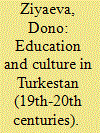

|
|
|
| 3 |
ID:
132314
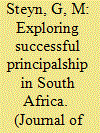

|
|
|
|
|
| Publication |
2014.
|
| Summary/Abstract |
In line with international studies, this study reports in a case study how a South African school principal succeeded in sustaining leadership despite the challenges South African schools experience, and how the principal's leadership practice related to core leadership practices required for a school principal to be successful. Data were collected by means of open-ended interviews with the principal and his staff. The following main themes were constructed: (1) Personal traits; (2) Leadership style; and (3) Ability to sustain and improve development. Secondary empirical data from previous studies in the school supported the findings in this study. The findings of this case study have implications for South African school principals: (1) principals need to be fully committed to improve the quality of learning in schools; (2) they need to be skilful in effectively using available resources; (3) successful principalship develops over time and requires a clear vision, optimism, high performance expectations and acting with care and integrity to nurture trust among role players
|
|
|
|
|
|
|
|
|
|
|
|
|
|
|
|
| 4 |
ID:
169988


|
|
|
|
|
| Summary/Abstract |
The Alliance Israélite Universelle, an international Jewish educational philanthropy based in Paris, began to establish modern, secularized schools for girls and boys in North Africa, the Middle East, and Eastern Europe in 1862. The first school was established in Iran in 1898. The Alliance saw itself as addressing the big questions of its time that faced Jews: antisemitism, poverty, and perceived backwardness. It sought to promote the integration of Jews as well as to advance the status of girls through educating them and opposing child marriage. This article examines the integration of Iranian Jews and the professionalization of women in Iran in the first half of the twentieth century, using the Alliance’s Jewish female school directors as a case study. It argues that family relationships and networks played a critical role in facilitating both of these modernizing processes.
|
|
|
|
|
|
|
|
|
|
|
|
|
|
|
|
| 5 |
ID:
161642
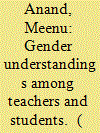

|
|
|
|
|
| Summary/Abstract |
Gender issues are of paramount interest in school education in India, but questions remain about what girls and boys actually learn about gender once they are in school. Are schools really places where teachers effectively combat traditional gender stereotypes among students? Relying on primary research in schools in Delhi, this article examines teachers’ biases and stereotypes regarding gender issues. Comparing this grassroots reality to the opinions on masculinity and femininity held by children in the same schools, the article identifies a need for more focused teacher education. The persistent gaps between tall claims about improved gender awareness, ambitious promises in policies and existing ground realities pose significant educational challenges for India, especially with regard to methods of promoting consciousness about gender-related issues in all domains of education.
|
|
|
|
|
|
|
|
|
|
|
|
|
|
|
|
| 6 |
ID:
161698
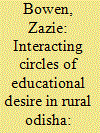

|
|
|
|
|
| Summary/Abstract |
Children from rural Odishan Scheduled Tribe and Scheduled Caste communities have an historically marginalized relation to schools and a corresponding greater involvement with informal education regimes and participation in everyday economic and cultural routines. Although radical state restructuring in recent decades makes rural school buildings more visible, inside the classrooms, students were often present and teachers absent. Drawing on ethnographic fieldwork, in Western Mayurbhanj, Odisha, I examine students’ engagement with school and argue that rural schools cannot be fully understood without examining the motivations of and interactions between three sets of stakeholders: state, local providers, and students. Further, the motivations, evaluations, and experiences of students deserve to be brought much more to the fore in light of their active roles in Mayurbhanj village schools and the significant effects of this involvement on both the nature of rural schools and the changes in rural blocks.
|
|
|
|
|
|
|
|
|
|
|
|
|
|
|
|
| 7 |
ID:
128532
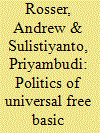

|
|
|
|
|
| Publication |
2013.
|
| Summary/Abstract |
Since the fall of Suharto's New Order, Indonesia's central government has substantially strengthened the legal and financial basis of universal free basic education (UFBE). Yet sub-national governments have varied considerably in their responses to the issue with some supporting UFBE and others not. Why has this happened? What are the implications for the future of UFBE in Indonesia? And what does Indonesia's sub-national experience tell us about the political preconditions for UFBE in developing countries? We try to shed some light on these questions by examining the politics of UFBE in Bantul and Sleman, two districts in the Special Region of Yogyakarta.
We argue (i) that these districts' different responses to UFBE have reflected the extent to which their bupati have pursued populist strategies for mobilising votes at election time and there has been resistance to UFBE from groups such as business, the middle classes, and teachers; (ii) that Indonesia's sub-national experience suggests that there is an alternative pathway to UFBE besides organisation of the poor by political entrepreneurs; and (iii) that the future of UFBE in Indonesia thus rests on the nature of bupatis' strategies for advancing their careers and the strength of local groups opposed to UFBE.
|
|
|
|
|
|
|
|
|
|
|
|
|
|
|
|
| 8 |
ID:
154978
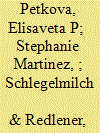

|
|
|
|
|
| Summary/Abstract |
This study characterizes trends in the frequency and characteristics of terrorist attacks in child-serving educational institutions around the world, examining the specific vulnerabilies of children and schools with regard to terrorist violence, as well as the various impacts that violence has on children, communities, and societies. Following the analysis of available data on terrorist attacks against educational institutions, vulnerabilities, and impacts, the study concludes with a discussion of what still needs to be understood in the intersection of child vulnerability and terrorism, and provides recommendations for improving resilience to terrorist attacks against child-serving educational institutions.
|
|
|
|
|
|
|
|
|
|
|
|
|
|
|
|
| 9 |
ID:
127979


|
|
|
| 10 |
ID:
154621
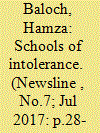

|
|
|
| 11 |
ID:
166657


|
|
|
|
|
| Summary/Abstract |
Why do terrorists engage in behavior that is extreme even by their own admission—killing children? This behavior poses a major puzzle to our understanding of terrorism, but it has been surprisingly underexplored. This article addresses the question of why terrorists intentionally target children with a comparative study of the two deadliest attacks in which children were deliberately targeted by a militant organization: the Peshawar (2014) and Beslan (2004) school massacres. The article identifies two factors that increase the likelihood that a terrorist group will target children. The first is the presence of internal rifts within an already highly violent organization. This is likely to trigger outbidding and, thus, result in more brutal attacks. The second is existentially threatening external pressure, which seriously weakens the group and, thus, leads it to select soft and shocking targets, such as schools. The findings are based on evidence drawn from primary and secondary sources, including interviews conducted in Peshawar and Islamabad, Pakistan, and Moscow, Russia.
|
|
|
|
|
|
|
|
|
|
|
|
|
|
|
|
|
|
|
|
|